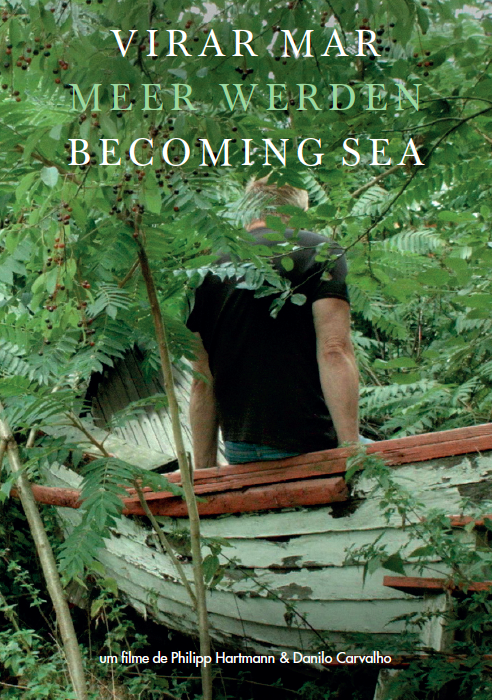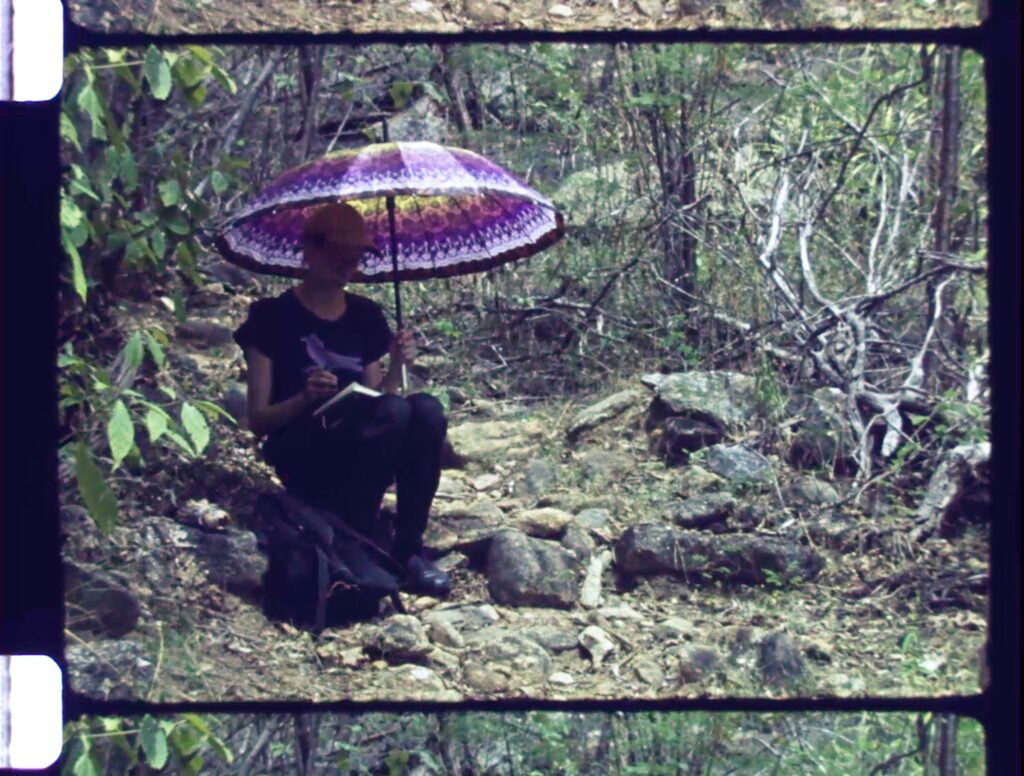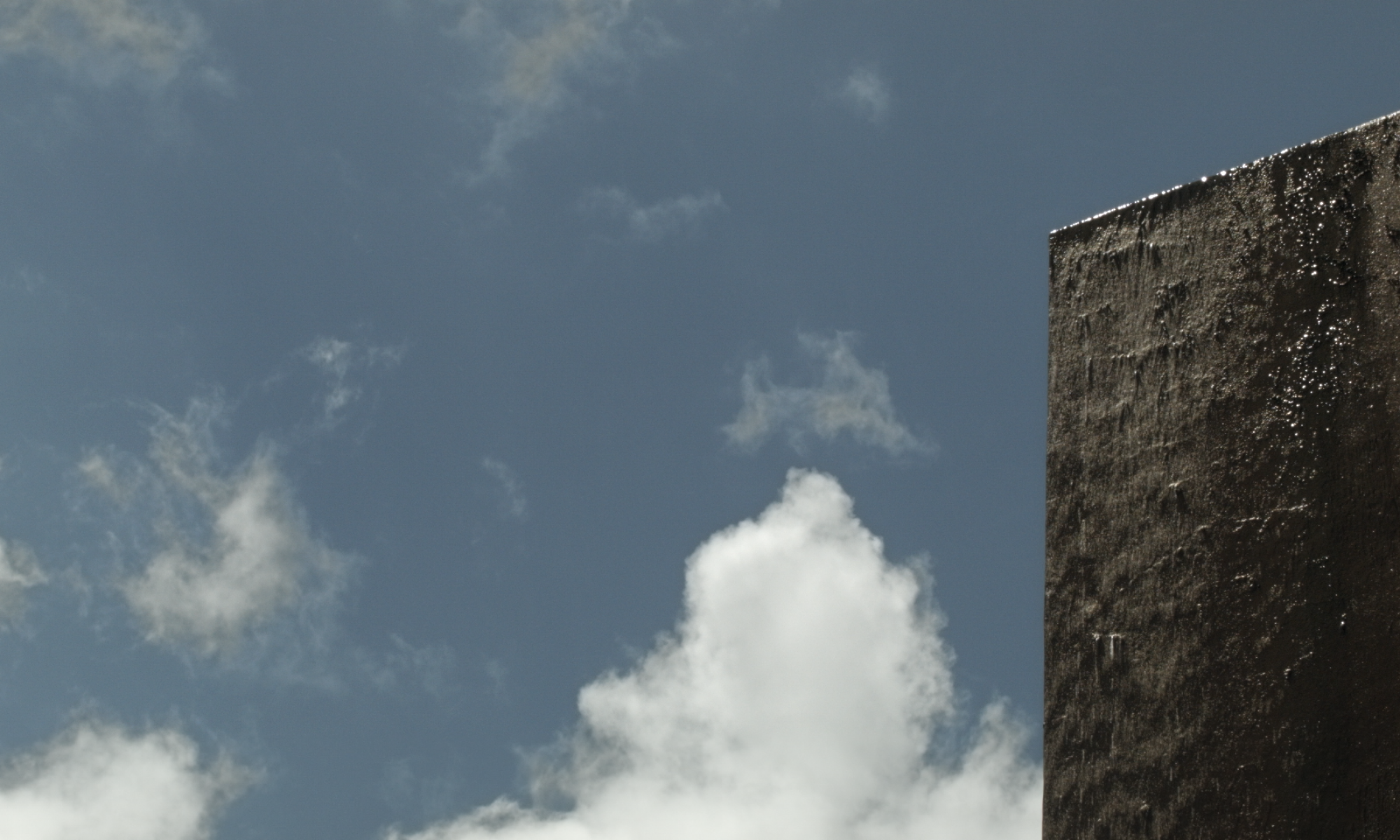dossiê para imprensa / presseheft / pressfolder – download pdf:

un barco sin vela – de Paula Gaitán
virar mar, de Philipp Hartmann y Danilo Carvalho, propone navegar en territorios profundos de la imaginación, atravesar pantanos, desiertos, continentes, y quizás un océano. Ensayo sobre el agua y la imposibilidad de esta, es una meditación existencial.
Pensar lo árido y lo fecundo, pensar la tierra y el flujo del río, pensar hombres y mujeres que habitan esas tierras milenarias como en el nordeste del brasil, territorio de profetas y milagros.
Quizás esa religiosidad, ese fervor místico, provenga del misterio y aridez de sus altiplanos, de la sequedad implacable de esa región del Brasil. Esperar el milagro es esperar la lluvia, esperar la palabra, la resurrección, el alimento, la música, un cometa, la fertilidad y el deseo.
La ultima imagen es fuerte, vemos dos personas en un barco en un jardín europeo, algunas plantas han crecido dentro del barco que parece una reliquia abandonada de antaño, a deriva y sin destino.
Text here in english and german and portuguese
Aesthetic Meteorology – by Roger Koza
Good filmmakers despise tourism. Their mission is to place the act of filming on equal footing with travels: then the camera becomes an extension of the eyes and the ears, even of the skin and tongue, and its movement obeys nothing but curiosity. Good filmmakers are curious, that is the virtue that secures an aesthetic.
In virar mar / meer werden / becoming sea the German filmmaker Philipp Hartmann travels south once again. He had already filmed in Bolivia and Argentina (About the Necessity to Travel the Seas), there was a time that he wanted to stop time or at least travel in it (Time Goes by like a Roaring Lion, his first feature-length film), then he traveled to 66 movie theaters in Germany and screened this debut feature film (66KINOS), and now he has visited Brazil to launch another film. In this country, which he got to know decades ago because of his economics studies and which he visits on a regular basis, he conjectured a film that needed to be made; perhaps he owed it to himself. In this faraway and immense country, whose official language he commands, he got to know Danilo Carvalho, a colleague who is also a sound engineer, and with whom he decided to embark on a film about water. Why select a topic that belongs more to the purview of meteorologists than filmmakers? How to film an element that is essential for the existence of life?
Carvalho and Hartmann revel in this question of how in three fantastic images right from the beginning. A mighty jet of water from a reservoir is the motif; the water there is the manifestation of unstoppable energy and the camera assumes the responsibility to bear witness to its might. The image also contains the recording of sound, another similar image follows, and, in the last part of the sequence, the water itself becomes the screen and harbors the moving images because a film is projected onto the jet. Mysterious connection and a paradox: nobody can step into in the same river twice, but it is quite possible to film this act and then to continue to repeat it indefinitely. To put it another way: the cinema can capture the future of water, the essential characteristics of an element that is after all defined by its mutability. Water in motion, water at rest, evaporated or condensed into clouds can be filmed as such, and in the course of virar mar / meer werden the various permutations of water are depicted with efficacy and with beauty. But water is not the only thing that gives life to this film.
There is one predominant poetic principle that governs such an aesthetic meteorology: contrast and continuity, which together create a charming dialectic that moves effortlessly from one region in Germany to another one in Brazil. This way it becomes possible to step from once scene in Dithmarschen into the Sertão of northeast Brazil and this transition happens both seamlessly and unannounced at the same time. This is how virar mar / meer werden strides along and it is also how its dialectic unfolds: the lushness of a landscape in Germany stand in marked contrast to the arid, eternally dry ecosystem of the one in the northern region of Brazil; the giant house of a mysterious German musician shines in juxtaposition with the houses of a village in the Sertão, where a filmmaker is making movies with his neighbors; the young Brazilian women enjoying a swim in the water reservoir are not too far away with their musings from the young women who chat with each other at the banks of a river in Germany; a mysterious angel can help the musician playing Bach in a church in Dithmarschen; and, a little later: an analogy of Christ – he may no longer be able to walk on water because he is now a human impersonation – greets Hartmann, who is busy with a sound recording in the Sertão. These are all similar yet different forms of life at the same time, unified by a film that strives to collect situations and details in order to create a kaleidoscopic portrait of the bond of our species with water.
And that’s why in virar mar / meer werden there are images of people watering their gardens – everywhere and all over as their daily work, images of wild rainfalls that allude to the apocalyptic imaginary, images of men and women who enjoy the contact of their bodies with water from rivers and waterfalls, of prehistoric fish moving around an aquarium, or of a view from the sky where you can experience the painful significance of a drought. From myth to ecology, from economics to fantasy, no connection to water is missing in this playful phenomenology of the element and it unfolds through the meticulous teasing out of the images and their surrounding sounds; because above all virar mar / meer werden is a cinematographic work, a flowing body made out of visible and audible layers that are destined to turn liquid matter into a concrete shape.
Translated by Daniel H. Wild
—-
spanish original and german translated version here:
Meteorología estética – de Roger Koza (en español)
Ästhetische Meteorologie – von Roger Koza (deutsch)
un email de Ignacio Agüero
querido Philipp
el domingo vi tu película y hoy quise verla de nuevo pero ya desapareció de vimeo el link que me enviaste. las películas siempre quiero verlas dos veces a lo menos. de todos modos percibí que haces películas inolvidables, en las que lo que queda es sobretodo una extraña sensación del tiempo. me gustó mucho el modo de cruzar las geografías, muchas veces de modo imperceptible hasta que te das cuenta que estás en otra tierra. mientras una se llena de agua la otra se vacía, como si el globo terráqueo fuera un péndulo, o una batea. es una película que todo el tiempo hace pensar, en nada en particular pero en todo. el tiempo, el espacio. nuestro tiempo en la tierra. queda también la sensación de grandes planos, grandes lugares, que aumentan la sensación de soledad, pero no la soledad angustiosa del individuo sino otra, una soledad ante lo grandioso. tenía muchas ganas de verla de nuevo para ver esas escenas cercanas y familiares en brasil. también es una película de silencios, en que queda sobretodo su forma, la forma que tiene la película, en la que muy sutilmente apareces tú en breves momentos haciéndola, dirigiéndola con la gente. es una película hipnótica que cada tanto te hace preguntar de qué trata, pues tiene la gracia de no irse al tratamiento de nada en particular sino de quedarse en lo grande, en el gran espacio. hasta el momento casi no he nombrado la palabra agua ( solo una vez antes ) pues a pesar de ser al parecer la imagen central, no es un tratado acuático. mis felicitaciones Philipp y Danilo, por lograr esa grandeza sin apuros. ya la veré otra vez, muchas gracias por compartirla antes de lanzarla. un abrazo grande.
Ignacio Agüero
text here: in english and german
Von Geröll und Geländern – von Katharina Pethke
Hier ersehne ich es, da ertränkt es mich.
Dieser Film hat nicht die Form von Wasser.
Mit diesem Widerspruch bewegt er sich von Minute zu Minute in der Gleichzeitigkeit verschiedener Kontinente und Realitäten. Zwischen blinden und hilflosen Versuchen der Menschenwesen, Selbstermächtigung zu erlangen. Auch gegen die Unübersichtlichkeit.
Nichts fließt, nichts fügt sich. Die Frage nach der Absicht szenischer Zugriffe, der Überhöhung vorgefundener Momente läuft ins Leere. Dabei entsteht allerdings etwas Übergeordnetes, die Gerölllandschaft wird erfahrbar. Etwas Eigentliches lässt sich erahnen. Blinde Versuche, dem Wasser Einhalt zu gebieten oder es heraufzubeschwören – und: Wie klingt es eigentlich?
Durst entsteht. Blinder, wütender Durst. Das Bedürfnis, sich anzulehnen, festzuhalten, sich zu orientieren. Ansätze eines Geländers bleiben Illusion. Wie Brocken eines Felsen deuten die einzelnen der episodischen Zugriffe in ihrer kantigen und fragmenthaften Art ihren, einen möglichen Ursprung an.
Kein pseudo-esoterisches Element! Vielmehr entblättert der Film des Wassers nackte und kalte Macht über das Leben. Nein, es gibt kein Geländer in dieser Gerölllandschaft. Da müsst Ihr allein durch…
Viel Spaß dabei!
Text here: in english and portuguese
Meer werden – ein Gespräch in Postkarten – zwischen Anne Döring und Philipp Hartmann
hier im: Magazin des Goethe-Instituts Lissabon
versão em português: «Virar mar» – Uma conversa em postais
Provoking Film/Complicating Hierarchy – An Ethnographic Film Script
by Theresa George
see full version in Anthrovison 7.2. here: https://doi.org/10.4000/anthrovision.6017

volverse mar
Años atrás, Hartmann sintió la necesidad de conjurar su cronofobia e hizo una película sobre el tiempo para curarse. En esta ocasión, no tuvo que deshidratarse para convocar a su viejo amigo y colega brasileño Carvalho para elegir el agua como tema esencial de una nueva aventura cinematográfica; le bastó su inteligencia al comparar la falta de agua en el Sertón y el exceso de esta en regiones del norte de su país para trabajar sobre un ensayo lúdico y dialéctico en el que geografías y personajes plasman y encarnan la relación existencial entre el elemento indispensable para la existencia de la vida y estilos de existencia que pueden invocar a Bach y el Apocalipsis, como también depender anímicamente del acto de filmar y hacer cine independiente en un pueblo perdido de Brasil. A la habitual cadencia narrativa propia del realizador y su precisión en los encuadres se suma aquí un riguroso trabajo sobre el sonido, el cual se devela sin hacerse notar durante toda una secuencia en la que se incluye una broma (sonora) en la que Cristo no consigue repetir la proeza de caminar sobre el agua.
(Roger Koza, para FICIC en con los ojos abiertos )

